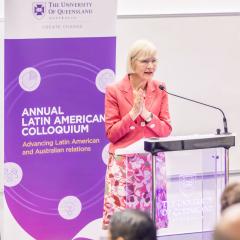From September 30 to October 4, 2024, The University of Queensland (UQ) was a major contributor to the “Key Technologies in Bioeconomy (KTB)” conference, an annual event initiated and organised by the Global Bioeconomy Alliance (GBA) and hosted this year by the Universidade Estadual Paulista (UNESP), Brazil.
The GBA was recently launched as a not-for-profit association, co-founded by UQ, UNESP, the Technical University of Munich (TUM), and the Danish Technical University (DTU). Its mission is to create a common platform for diverse stakeholders to build momentum towards a sustainable bioeconomy.
By fostering cross-disciplinary collaborations between academia, industry, policymakers, and NGOs the GBA aims to refine research questions that drive real-world impact, connect industry R&D needs with cutting-edge research, and facilitate the implementation of innovative technologies. The network also advocates for government support, helping to establish green policies and funding programs that will accelerate the deployment of bioeconomy solutions at scale.
“The KTB Conference is a vital platform for building momentum for and fostering international partnerships, enabling us to collaboratively tackle global environmental, societal and economic challenges by driving the development of innovative, sustainable technologies,” - Professor Gary Schenk, UQ's Biosustainability Hub.
This year’s event brought together over 100 representatives from the research sector, industry and government agencies from Brazil, Australia, Germany, Denmark, the UK and USA to advance research and technology developments in key areas of the bioeconomy.
In particular, the conference focused on creating impact in areas such as sustainable agriculture, bioresource valorisation, decarbonisation, cell-free biomanufacturing, and sustainable mining. The conference featured action-oriented and future-focused discussions, emphasising the importance of building a sustainable future amidst unprecedented challenges, changes and disruptions.

Discussions at the conference showcased recent activities in Europe, Australia, the Global South, and beyond, and highlighted the fact that a successful bioeconomy needs to be truly global to make sustainable impact to common health and wealth. Potential funding sources for collaborative projects were presented, and the Novo Nordisk Foundation announced €140,000 annual support, initially for the next three years, to:
- recognise achievements by individuals and teams in bioeconomy-related developments
- raise the visibility of the GBA; and
- promote global activities with impact in bioeconomy.
Apart from contributions from leading technology and industry experts, the KTB conference also facilitated a workshop to develop a proposal for a Joint Masters program in bioeconomy, “an international teaching innovation that aims to train the next generation of global leaders in sustainability”, said Ms Kayla Warner from UQ’s Global Engagement team, UQ’s lead in the development of this program.
The GBA and the KTB conference will continue to lead and promote technology developments at scale and globally, with the next KTB conference already being planned by DTU for 2025.




